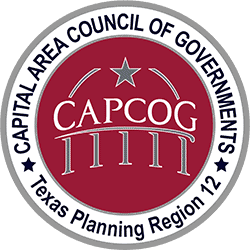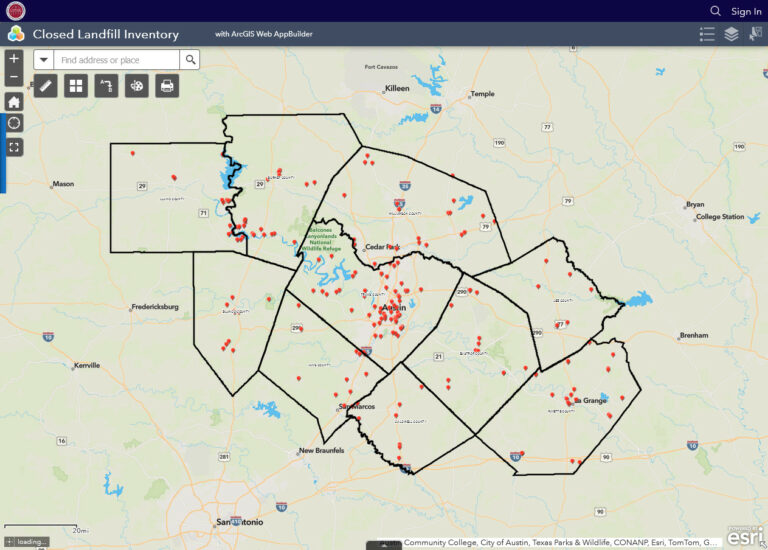Home » Divisions » Regional Planning & Services » Solid Waste
Solid Waste
CAPCOG is the state designated planning agency for solid waste management issues in the region. The Solid Waste Program reviews applications for landfill permits and solid waste grants.
Each year CAPCOG provides oversights on Texas Commission on Environmental Quality (TCEQ) funding for local government projects, including source reduction, recycling, local illegal dumping enforcement, solid waste studies, household hazardous waste collections, and public education efforts.
CAPCOG also provides technical assistance to local governments on solid waste issues and continuing education opportunities for local governments and solid waste professionals.
Solid Waste Grants
Using state funding generated from selected landfill fees, Texas councils of governments such as CAPCOG are able to support eligible projects within its jurisdiction that help implement the regional solid waste management plan. Grants are awarded on a biennium basis.
Regional Solid Waste Management Planning
The Regional Solid Waste Management Plan outlines the activities and priorities that will be initiated in the region throughout the planning period of 2023-2042. The plan includes population and growth patterns, economic activity, waste generation and characteristics, waste management systems, summary of needs and problems, goals and objectives, and an action plan for the region.
Municipal Solid Waste Facility Siting Ordinance Guidance
CAPCOG, through its Solid Waste Advisory Committee, has drafted an example ordinance for counties to prepare municipal solid waste facility siting ordinances. The example ordinance establishes guidelines of where solid waste disposal, processing, and storage facilities can be located. It was developed by solid waste professionals, not by legal professionals, to explain issues related to municipal solid waste facilities. Ordinances developed by counties that follow this model should be reviewed by legal counsel to ensure they meet their legal obligation. The example is not to be substituted for legal advice.
Conformance Reviews
CAPCOG reviews proposed municipal solid waste facility applications submitted to the Texas Commission on Environmental Quality (TCEQ) as part of its conformance review process with regional and local solid waste management plans. CAPCOG and the 23 other regional planning commissions are provided this opportunity by Texas statute when new facilities are proposed or a site expands.
To provide a proper review of a site application, CAPCOG developed a conformance review process and checklist that guides organizations for compliance with solid waste plans throughout the region. The process focuses on ensuring sites do not adversely impact human health or the environment by determining a proposed site’s impacts upon counties, cities, communities, groups of property owners, or individuals in terms of compatibility of land use, zoning in the vicinity, community growth patterns, and other factors associated with the public interest.
Each organization requesting a new site or site expansion will need to download and submit the Conformance Review Checklist to CAPCOG. The project will then be reviewed by the CAPCOG Solid Waste Advisory Committee (SWAC) and its Executive Committee. Submit checklists to Ken May, CAPCOG’s regional program coordinator.
CAPCOG recommends that organizations request a pre-submittal meeting with the COG, so they best understand the process, the checklist and address any issues prior to the review.
Conformance Review Meetings
After submitting the checklist, CAPCOG will schedule a SWAC subcommittee meeting to initially review the project before the project is reviewed during a later SWAC meeting. The applying organization is encouraged to attend and present to both the subcommittee and the SWAC. The SWAC will then make a recommendation on the project’s conformance to CAPCOG’s Executive Committee, which will then make a final conformance determination that is submitted to TCEQ as advisement. The applicant will be notified of all meeting times and several of the meetings’ times will be posted as required by the Texas Open Meetings Act.
Regional Environmental Task Force (RETF)
The Regional Environmental Task Force, a network of law and code enforcement officers who collaborate to combat illegal dumping and other environmental crimes in Central Texas, has served the 10-county CAPCOG region since 1996. Multiple jurisdictions the task force works together to conduct outreach and provide educational opportunities and operates an illegal dumping hotline to help bring violators to justice and protect public health and the environment across the region.
A board of directors representing the 12 member agencies – from 10 counties and the cities of Austin and Cedar Park – governs the group. The board in turn annually elects an executive committee to manage task force business.
CAPCOG’s Solid Waste Programs provides administrative support, coordinates RETF training and maintains the illegal dumping hotline. Funding for CAPCOG support comes from the Texas Commission on Environmental Quality’s distribution of landfill tipping fees to COG solid waste programs.
The RETF conducts about three training classes per year in basic and intermediate environmental law enforcement. Certified instructors from various agencies, including the City of Austin and the Travis County Attorney’s Office, teach the classes. In addition to discussing the growing problem of illegal dumping and other environmental crimes, instructors address civil versus criminal prosecution, unauthorized discharges, solid waste and nuisance violations, search or administrative warrants and outdoor burning.
Classes provide continuing education credit for Texas Commission on Law Enforcement, Code Enforcement, Sanitarians, and OSSF inspectors. While they are largely for RETF member agencies, sessions are open to the public as space allows.
The task force also publishes a free Environmental Law Enforcement Guide — a handy resource on selected laws, definitions and tips related to illegal dumping, water pollution, outdoor burning and more.
Closed Landfill Inventory
In 1993, the Texas Legislature passed House Bill (HB) 2537, which required Councils of Governments (COGs) to develop an inventory of closed municipal solid waste landfills for their regional solid waste management plans. The bill was in response to concerns and incidents involving public health and safety when development occurred over property once used for waste disposal.
Please note that persons have a continuing obligation to comply with Title 30 Texas Administrative Code 330.954 and 330.59(h)(2), relating to Permit Required for Development Over a Closed Municipal Solid Waste Landfill Unit, if an unrecorded municipal solid waste landfill is discovered or determined to exist.
Illegal Dumping
Whether it’s leftover tires thrown down a ravine; old furniture, plastics and chemicals tossed in a field; or other suspicious activity, report illegal dumping anonymously anytime by calling 1-877-NO-DUMPS (1-877-663-8677) or completing the convenient online form. CAPCOG forwards illegal dumping complaints to the appropriate jurisdiction for investigation.
Find Facilities for Proper Recycling and Disposal
Many types of solid waste require a variety of facilities for disposal. The RETF’s Google-powered interactive online recycler map shows the locations and contacts for all recycling centers, household hazardous waste facilities and landfills in the Capital Area Council of Government’s 10-county region. Simply select the placemark of your choice to view the contact information for that location.
Workshops
CAPCOG provides a number of workshops on solid waste management for entities in its 10-county area. Workshops provided by CAPCOG have included topics about recycling, applying for solid waste management grants, disaster debris management and more.
Publications
The CAPCOG Solid Waste Program has funded and compiled a number of reports pertaining to solid waste collection and disposal throughout the region.

